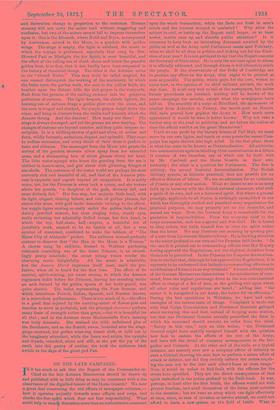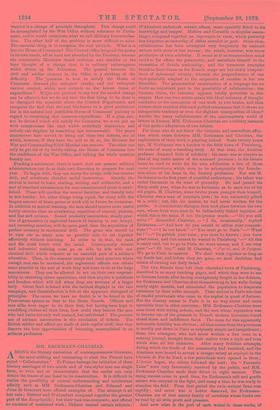ON THE LATE CAMPAIGN.
Ts it too much to ask that the Report of the Commander-in- 1_ Chief on the late Autumn Manceuvres should be drawn up and published with as little delay as may be consistent with a due observance of the dignified leisure of the Horse-Guards? We hear a great deal concerning the evil effects of newspaper criticism,— how it operates unjustly towards some officers and corps, and checks the free spirit which does not fear responsibility. What could help to steady discussion more than an authoritative comment
upon the whole transaction, while the facts are fresh in men's minds and the interest aroused is unabated ? Why allow the subject to cool, or bottle up the Report until larger, or at least newer, matter rises up and absorbs public attention ? Is it necessary to keep back an interesting document awaited by the public as well as the Army until Parliament meets next February, when we shall be all deep in politics and looking out for the Exer- cises of next year? It is not pertinent to say that the Report concerns the Secretary of State alone. He is only the national agent to whom it is officially addressed, and through whom it will ultimately reach the people. If the observations of the Duke of Cambridge are to produce any effect on the Army, they ought to be printed as soon as possible. The public, which pays for the cost, wishes to know how, in the opinion of its chief military servant, the work was done. It is all very well to rail at the newspapers, but unless former precedents are reversed, nothing will be known of the peace campaign for months, except what the newspapers have told us. The assembly of a corps at Blandford, the movement of another from Aldershot to Pewsey, the march-past on Beacon Hill, have proved how popular the Army is. How much more appreciated it would be were it better known ! Why not take a further step on the road to publicity, and set before the nation at once the official verdict on the great Manceuvres?
Until we can profit by the literary leisure of Pall Mall, we must move by our own lights, and touch on some points the recent Cam- paign has again thrown into high relief. In the first place, there is what has come to be known as Decentralisation. All authorita- tive commentators agree in labelling Over-centralisation as a defect. It consists of two branches, one of which can be dealt with by Mr. Cardwell and the Horse Guards on their own authority ; the other is a question for Parliament. The first is military, the second financial decentralisation. The British Military system, as hitherto practised, does not provide for an effective division of labour. We are no advocates for an imitation of Prussia or any other nation. What we desire to see is an army built up in harmony with the British national character, vital with a spirit of its own, and not a borrowed spirit. But where a general principle, applicable to all States, is strikingly exemplified in one which has thoroughly studied and practised army organisation for practical purposes, we may properly act on the reminder, and amend our ways. Now, the German Army is remarkable for the gradation of responsibilities. From the company chief to the corps commander, each has a special and free field. He is bound to obey orders, but holds himself free to obey the spirit rather than the letter. We may illustrate our meaning by quoting part of a note from Lieutenant Maurice's Essay. He is drawing attention to the notice prefixed to our own and the Prussian drill-books. "In the one it is pointed out to commanding officers that Her Majesty having approved the Regulations, not the slightest deviation from them is to be permitted. In the Prussian the Emperor draws atten- tion to the fact that, although he has approved the Regulations, it is expressly to be understood that latitude to commanding officers as to modification of forms is in no way withheld." A recent military critic of the German Manceuvres characterises "decentralisation of com- mand, from the highest personage down to the non-commissioned officer in charge of a file of men, as the guiding rule upon which all other rules and regulations are based ;" adding that "the sooner it is recognised in our Army, the better for its efficiency." During the late operations in Wiltshire, we have had some examples of the reverse state of things. Complaint is made not only that Corps Commanders and Divisional Generals galloped about surveying this and that, instead of keeping some station, but that one Divisional General actually prescribed the form in which his command should execute an order from the chief. "Surely in this case," says an able writer, "the Divisional General might have usefully occupied himself with the question how best to sustain the efforts of the rest of the Army, and have left the detail of company arrangements to the Bri- gadier and Colonels. At the other end of the scale, as a typical instance, one scarcely ever saw a company officer of infantry or even a Colonel showing his men how to perform a minor affair of attack or defence, nor did they strictly enforce the orders requir- ing the men not to fire into each other's faces at close range." Now, it would be unfair to find fault with the officers for the errors here specified. They are the direct consequences of that spirit embodied in the notice prefixed to the Drill-book. In war, perhaps, at least after the first brush, the officers would act with greater freedom, and avail themselves of the forms most suitable to the occasion ; but we want an army which can fight effectively at once, since, in case of invasion or service abroad, we could not afford to learn a new system on the field of battle. What is
wanted is a change of principle throughout. This change could be accomplished by the War Office without reference to Parlia- ment, and it would constitute what we call Military Decentralisa- tion. The other half of the problem is more difficult to solve. The essential thing is to recognise the real obstacle. What is it but the House of Commons? The Central Office keeps all the power in its own hands, all at least not absorbed by the Treasury, because the accountable Ministers dread criticism and shudder at the bare thought of a charge that it is military extravagance which drives up the Estimates. The quarrel between the civil and soldier element in the Office is a shirking of the difficulty. The".question is how to satisfy the House of Commons' demand for stringent checks, and yet relinquish central control, which now extends to the lowest items of expenditure ? We",,do not pretend to say how the needed change can be effected, but we do say that the first thing to be done is to disregard the squabble about the Control Department, and recognise the fact that the real hindrance to a good settlement lies in the natural and justifiable House of Commons' jealousy in regard to everything that concerns expenditure. If a plan can- not be devised which will satisfy the Commons, we must put up with compromises like that which everybody deprecates, and nobody can displace by something less unreasonable. The peace manoeuvres have served to bring out these two defects, one of which, however, if they have the will to do so, the Minister for War and Commanding Field-Marshal can remove. The other can only be got rid of by boldly taking the House of Commons into the confidence of the War Office, and talking the whole question frankly out.
Pending n settlement, there is much that our present military administrators can do at their own discretion to prepare for next year. To begin with, they can worry the troops with less routine drill, and substitute therefor useful instruction. Already the recruit is bound to learn reading, writing, and arithmetic, and a sort of standard examination for non-commissioned posts is estab- lished. These will quicken the mental faculties, and thereby help to win battles ; for, other things being equal, the army with the largest amount of brain-power at work will in future be victorious. In addition to mental training, the men should receive more useful bodily exercise than an everlasting repetition of manual, platoon, and line and column. Sound musketry instruction, steady prac- tice of gymnastics (a neglected branch of training in our Army), and recurring marches, will do more good than the acquisition of perfect accuracy in mechanical drill. The great aim should be to turn out as many men as possible able to act together effectively without touching. In order to do that, the rank and file must touch with the mind. Consequently mental and industrial training must go on side by side with me- chanical drill, which remains as an essential part of a soldier's education. Then, in the summer camps and local quarters where enough men can be mustered, the regimental officers can obtain some practice in the sort of work they will have to do at the large manceuvres. They can be allowed to act on their own responsi- bility in executing minor operations, and thus acquire a quickness and freedom which will tell when they are sections of a larger body. Great fault is found with the tactical displays in the late campaign, and dissatisfaction is felt at the apparent disregard of principles. The cause, we have no doubt, is to be found in the Procrustean system so dear to the Horse Guards. Officers and men alike were eager to do their best, but having been kept in swaddling-clothes all their lives, how could they behave like men who had limbs not only well trained, but unfettered ? The greatest use of autumn manceuvres is the revelation of defects. The British soldier and officer are made of such capital stuff, that they deserve the best opportunities of becoming accomplished in an arduous profession.



































 Previous page
Previous page